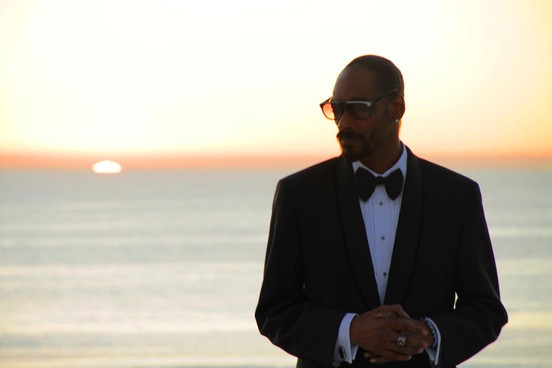
Maybe it was the fact that we had to sit in downtown rush-hour Los Angeles traffic before we got to the Grammy Museum. But probably, it was the fact that we pressed through such a long, shitty day because the light at the end of the tunnel was the knowledge that after trying for so many damn years, we were finally going to get to meet Snoop Dogg — and had just learned that tha Doggfather wouldn't be sitting on the panel discussing the new VH1 documentary titled Uprising: Hip Hop and the L.A. Riots.
Whatever the case, we was pissed when the woman next to us asked if we would stop taking pictures because the beeping on our camera was preventing her from hearing.
]
The film itself was well done and included lots of rarely-before-scene footage from the “golden” era of West Coast hip-hop. We dug seeing interviews with MC Ren, the late Eazy-E, Ice Cube, Dr. Dre, DJ Yella, Ice-T, KRS-One and Kurupt and how these artists seemingly predicted that the riots would happen.
N.W.A's seminal anthem “Fuck Tha Police” is used heavily in the documentary and rightfully so. The song's inclusion is mandatory considering how this documentary is aimed at the connection between hip-hop and the events leading up to and after the riots. That said, the most powerful connection between the track and the riots was not the song itself, but the footage of graffitied “fuck the police” and “fuck tha police” that was spray painted in looted areas during those tumultuous three days. You can talk all about how rap music was the voice of a voiceless generation, but it's only until you see these words written on walls when you realize that hip-hop was more than a musical genre during this era — it literally was the soundtrack to thousands, if not millions, of people living in poverty who were fed up with police harassment. Black, white, red, purple, brown, green … it doesn't matter, because that's a message we all understand.
As a hip-hop fan, the coolest part of the film was the chance to see the actual interviews Dr. Dre sampled on the song “The Day The Niggaz Took Over” from 1992's The Chronic. We always assumed that guy talking about being down for the Africans in the United States or the other guy sampled on “Lil Ghetto Boy” who claims if he was to die for a child to have a brighter future, then “he's a dead motherfucker” were real people, but this documentary proves not only were they real, the words they spoke came from a very, very real emotional place.
Still, we were promised Snoop (who narrates the film) and he wasn't there. No explanation was given, nor was the D-O-double G's absence mentioned. Countless emails had told us he'd be there and that he, along with every other panelist, would be available for interviews after the discussion. In all fairness, perhaps we could have spoken to the panelists had the fire alarm not gone off towards the end of the discussion. We broke out, knowing our quest to meet Snoop continues.


CBD exceeded my expectations in every way thanks https://www.cornbreadhemp.com/collections/full-spectrum-cbd-oil . I’ve struggled with insomnia in the interest years, and after tiring CBD pro the prime mores, I for ever experienced a complete night of restful sleep. It was like a weight had been lifted misled my shoulders. The calming effects were merciful still intellectual, allowing me to meaning free uncomplicatedly without sympathies punchy the next morning. I also noticed a reduction in my daytime apprehension, which was an unexpected but welcome bonus. The tactfulness was a minute rough, but nothing intolerable. Overall, CBD has been a game-changer quest of my nap and uneasiness issues, and I’m appreciative to procure discovered its benefits.